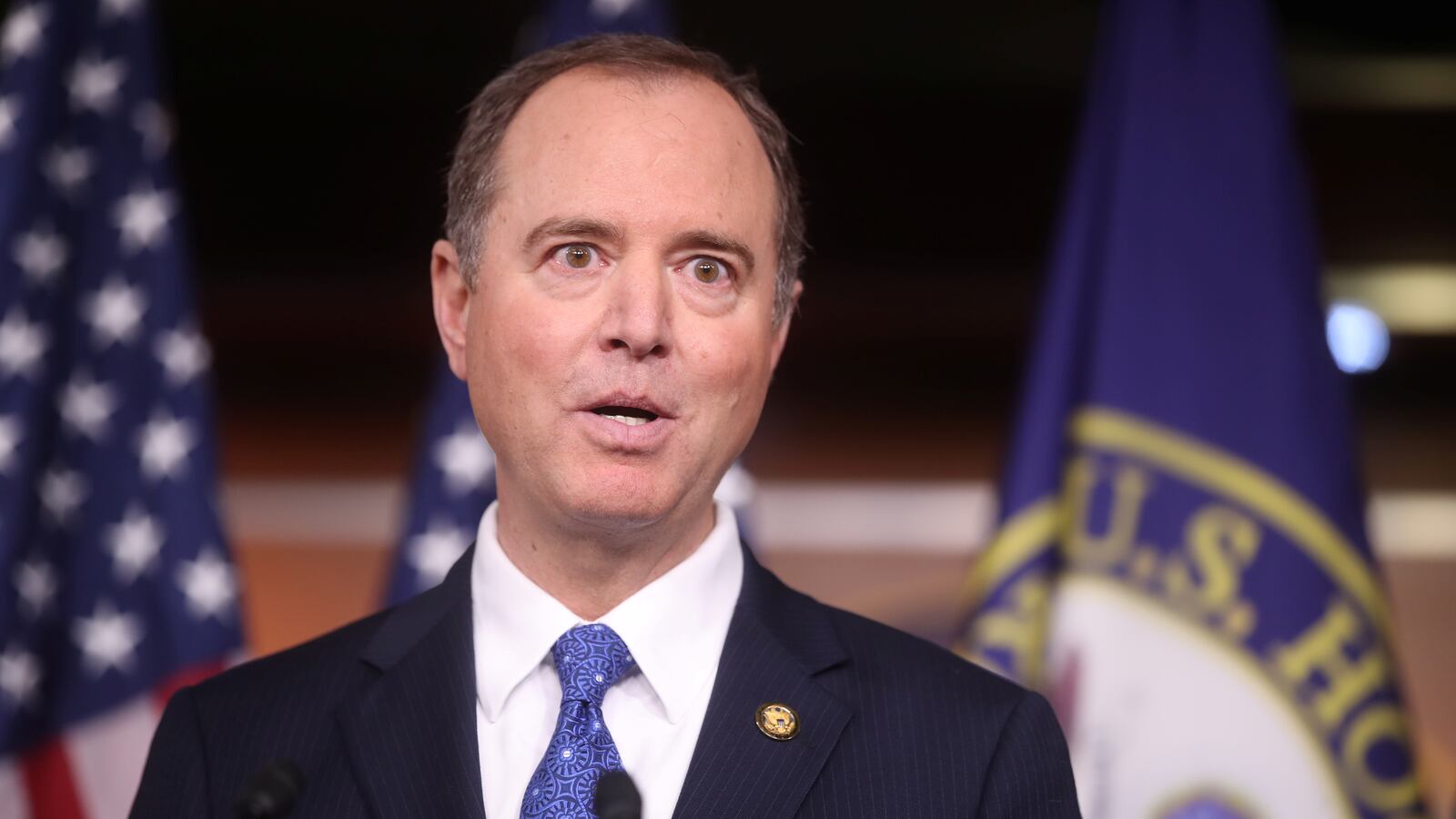Democrats on the House intelligence committee concluded that President Donald Trump was “the author of his own impeachment inquiry” by withholding critical political and military support from Ukraine until President Volodymyr Zelensky agreed to announce damaging investigations into Trump’s domestic political enemies.
As widely expected, the Democratic report, released Tuesday ahead of a committee vote to formally adopt it, found Trump to have compromised the presidency through what it called “the scheme” to enlist Ukraine to damage rival Joe Biden. “The President engaged in this course of conduct for the benefit of his reelection, to harm the election prospects of a political opponent, and to influence our nation’s upcoming presidential election to his advantage,” the report found.
In addition to the substance of “the scheme,” the Democrats characterized Trump as the first president in U.S. history “to seek to completely obstruct an impeachment inquiry.” They cited a “coordinated and comprehensive” effort across the administration to stop witnesses from testifying before the inquiry. More successful was a complementary administration campaign that stifled 71 document requests to various government agencies.
The 300-page report laced together the public testimonies of key witnesses into a clear narrative. But it also contained new, previously unreported call records, acquired from AT&T according to a footnote, that showed Rudy Giuliani, Trump’s personal lawyer, in frequent voice and text contact with the White House and Rep. Devin Nunes (CA), the senior Republican on the committee. Some of those contacts occurred during critical periods, such as August 8, after former envoy to Ukraine Kurt Volker, a player in “the scheme,” urged Giuliani to nail down a White House visit for Zelensky that never materialized.
The White House’s refusal to provide internal documents may have worked against its attempts to show Trump’s innocence. In a piece of testimony seized upon by the White House, Gordon Sondland, the U.S. ambassador to the European Union, claimed he had a conversation with Trump on or around Sept. 9. On that alleged call, Sondland said he asked Trump an “open-ended question” about what he wanted from Ukraine and Trump allegedly replied he sought “nothing” from Ukraine.
Yet the committee was unable to corroborate that account and called its existence into question. “A call on September 9, which would have occurred in the middle of the night, is at odds with the weight of the evidence and not backed up by any records the White House was willing to provide Ambassador Sondland,” the report noted.
Sondland was one of the most powerful witnesses before the inquiry. He reversed his previous statements to the committee by confirming a “quid pro quo”: a White House meeting for Zelensky in exchange for the investigation announcement. Sondland also said that it was as obvious to him as “2+2=4” that the military aid would flow only when Ukraine announced the investigations. Republicans, who had expected Sondland to come to Trump’s defense, noted that Sondland did not have first-hand knowledge of that.
The Democrats’ report will form the basis of impeachment charges to be written by the House judiciary committee, which will begin its impeachment proceedings on Wednesday.
Trump and his congressional GOP allies countercharge that the president did nothing wrong and the fault lies with Democrats for stopping at nothing to remove Trump from office. Ahead of the report, the intelligence committee Republicans released their own version, which portrays the pressure campaign as a rogue effort by Giuliani.
Over a week of high-profile public hearings in the intelligence committee featured testimony from 17 witnesses, mostly current and former officials from the State Department, National Security Council, Defense Department and vice president’s office. Yet the report characterized evidence against Trump as existing in plain sight, such as a summary of a fateful July 25 call Trump had with Zelensky in pursuit of a “favor” ahead of the White House visit or the release of nearly $400 million in aid from the State Department and Pentagon frozen at the beginning of July.
“The call record alone is stark evidence of misconduct; a demonstration of the President’s prioritization of his personal political benefit over the national interest,” the report found.
As well, the report lambasted the administration’s embrace of “conspiracy theories,” pushed by “self-serving” ex-Ukranian officials to Giuliani and allies in conservative media like Fox News’ Sean Hannity and The Hill’s John Solomon. Those conspiracy theories led to Trump firing the U.S. ambassador to Ukraine, Marie Yovanovitch, who characterized herself in testimony as an obstacle to the pressure campaign. It also led to the assertion, increasingly embraced by mainstream Republicans, that Ukraine interfered in the election, something ex-NSC senior official Fiona Hill characterized as Russian disinformation meant to distract from Russia’s 2016 digital break-in to a Democratic National Committee server and online propaganda for Trump’s benefit.
The Democrats called Trump’s misconduct neither “an isolated occurrence, nor… the product of a naïve president.” They cited Trump’s public urging of China, in addition to Ukraine, to investigate Biden. And they noted Russia’s “unprecedented and sweeping campaign of election interference” on Trump’s behalf, “which the President welcomed and utilized.”
While committee Republicans portrayed Trump’s pressure on Ukraine as sincerely motivated by anti-corruption impulses, the Democrats charged instead that the “scheme” weaponized extant corruption in Ukraine and sought to benefit from it.
Trump’s desired investigations into Biden and the alleged Ukrainian interference in the 2016 election were without “legitimate predication” and the sort of thing the U.S. usually opposes. “In so doing, the President undermined U.S. policy supporting anticorruption reform and the rule of law in Ukraine, and undermined U.S. national security,” the report charged.
Betsy Swan, Lachlan Markay, Jackie Kucinich, Erin Banco contributed reporting






